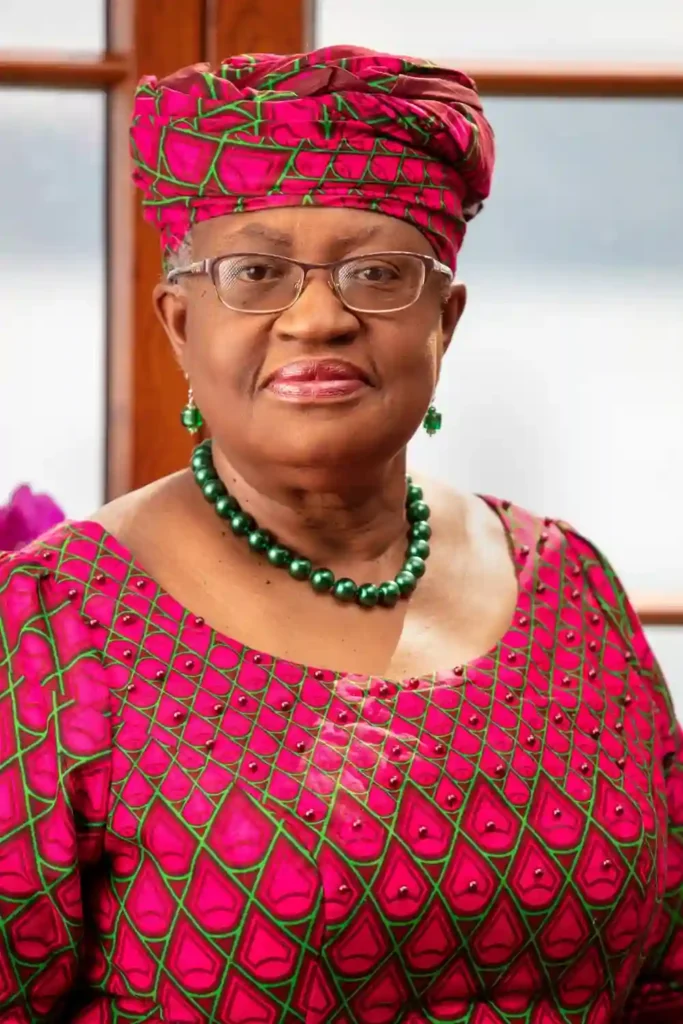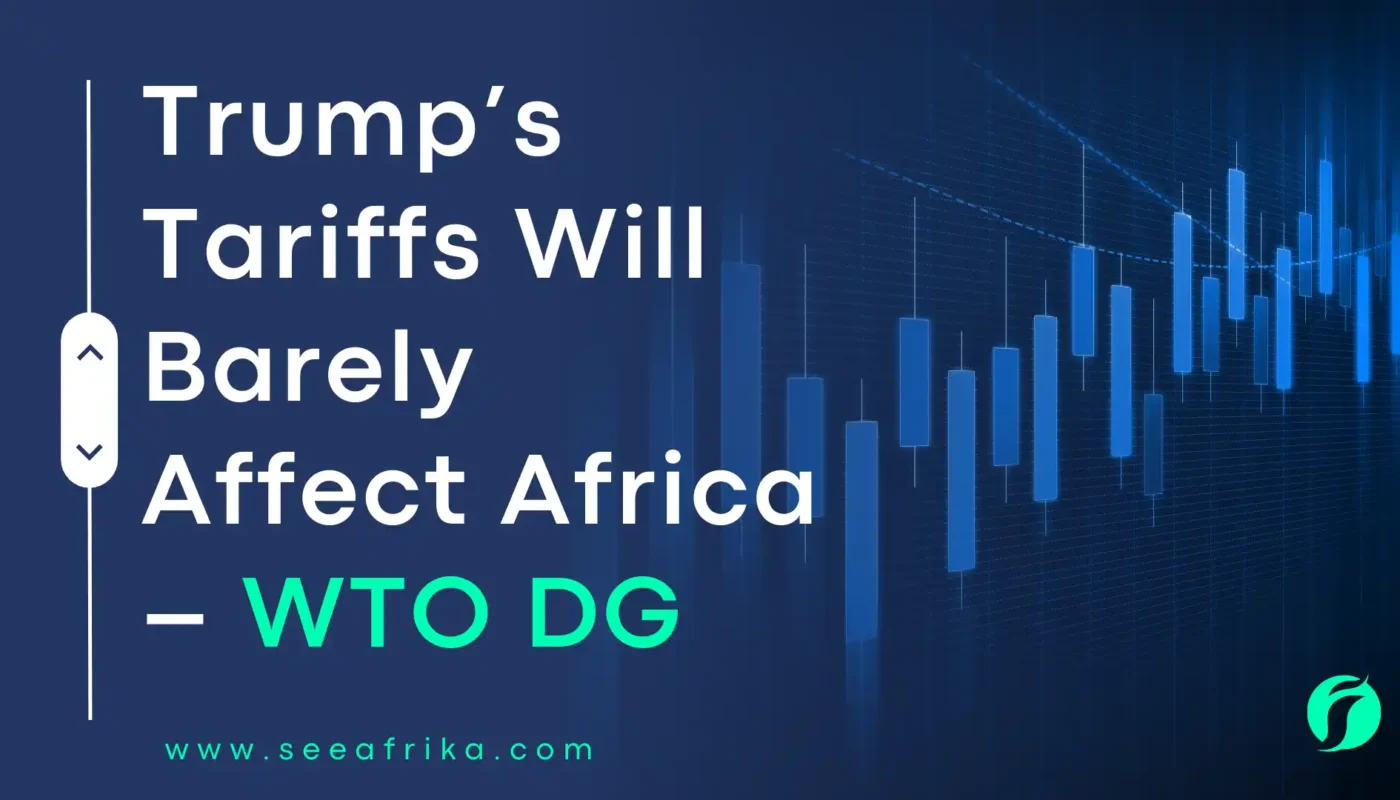The recent wave of U.S. trade protectionism, branded as “Trump’s tariffs,” has sent shockwaves through global markets. But according to Dr. Ngozi Okonjo-Iweala, Director-General of the World Trade Organization (WTO), Africa will feel only a minimal impact from these sweeping measures.
Trump’s tariffs are part of a broader effort to bring manufacturing back to the U.S. and address trade deficits. Still, analysts argue that the policy may backfire by raising costs for American consumers and harming developing economies. African leaders have so far avoided retaliation, instead seeking dialogue and exemptions from the U.S. administration.

Source: WTO
Trump’s Tariffs: What Are They?
President Donald Trump’s administration imposed a baseline 10% tariff on goods from nearly every country, escalating to much higher rates for nations with significant trade surpluses against the U.S. Some African countries, such as Lesotho and Madagascar, have been hit with tariffs as high as 50% and 47% respectively, while others like South Africa and Nigeria face rates of 31% and 14%.
These tariffs effectively override the African Growth and Opportunity Act (AGOA), a 25-year-old law that granted duty-free access to the U.S. market for over 30 African nations.
Related news: African Tech Funding Declines 5% in Q1 2025, Reaching $460 Million
Trump’s Tariffs and African Trade Exposure
Despite the headline-grabbing figures, Dr. Okonjo-Iweala emphasized that Africa’s direct trade exposure to the U.S. is limited. Only 6.5% of Africa’s exports go to the U.S., and just 4.4% of its imports come from there. This limited exchange means that, for the continent as a whole, Trump’s tariffs will have a minimal immediate economic impact.
“The trade of the continent is very limited with the USA. We have done the analysis, and the impact on the continent as a whole is not significant,” Okonjo-Iweala stated.
Impact on African Economies: Winners, Losers, and Vulnerabilities
While the overall effect may be muted, certain countries and sectors are more exposed. Lesotho, for example, exports around $200 million in textiles to the U.S. and now faces a 50% tariff, which threatens jobs and growth in its export-dependent economy. Madagascar, a major vanilla exporter, and Ivory Coast, the world’s largest cocoa producer, are also hit with steep tariffs, which could raise prices for U.S. consumers and squeeze African producers.
However, many African exports-especially oil, gas, and critical minerals-are exempt from the new tariffs. This shields major economies like Nigeria and South Africa from the worst effects, as these commodities make up the bulk of their exports to the U.S.
Related news: Nigeria and South Africa Enter Mining Cooperation Deal
Trump’s Tariffs and the African Growth and Opportunity Act (AGOA)
Trump’s tariffs have effectively nullified AGOA, ending decades of preferential, duty-free access for African goods entering the U.S. market. While few African countries fully utilized AGOA, it was a crucial tool for export growth in nations like Lesotho, Madagascar, and South Africa. The sudden imposition of tariffs undermines this progress and creates new uncertainty for African exporters.
Broader Impact on Developing Countries
The consequences of Trump’s tariffs extend beyond Africa. The United Nations trade agency warns that global trade could shrink by 3-7%, with developing countries facing the harshest fallout.
The International Trade Centre projects that global GDP could decline by 0.7%, and some of the world’s poorest nations could see their export revenues plummet. China’s Commerce Minister has also warned that these tariffs could trigger a humanitarian crisis in the least developed countries.
Also read: Top Fintech Companies in Africa
African Trade and Investment: A Call for Intra-Continental Growth
Dr. Okonjo-Iweala used the moment to highlight a deeper issue: Africa’s low level of trade with the U.S. reflects broader structural challenges. She urged African leaders to focus on strengthening regional and intra-African trade, leveraging the African Continental Free Trade Area (AfCFTA) to build resilience and reduce dependence on volatile external markets.
“We cannot trade more externally, where our share is only 3 per cent of global trade, or internally, where intra-African trade remains at 16 to 20 per cent at best,” she said.
She also called for increased investment within Africa, noting that declining aid flows make self-sustained growth more urgent than ever.
Related news: Tech Startups in Africa: A Thriving Ecosystem
Limited Direct Impact, But Deeper Lessons
While Trump’s tariffs will barely affect Africa in aggregate terms, they expose the continent’s vulnerability to shifts in global trade policy and underscore the need for deeper regional integration and industrialization.
The end of AGOA’s duty-free era is a wake-up call for African policymakers to accelerate intra-continental trade and investment, ensuring that Africa’s future is shaped from within rather than dictated by external shocks.
If you enjoy our content, you’ll love the amazing stories we share on Facebook, Telegram, and Twitter!
Subscribe and follow us for more premium SeeAfrika content.




